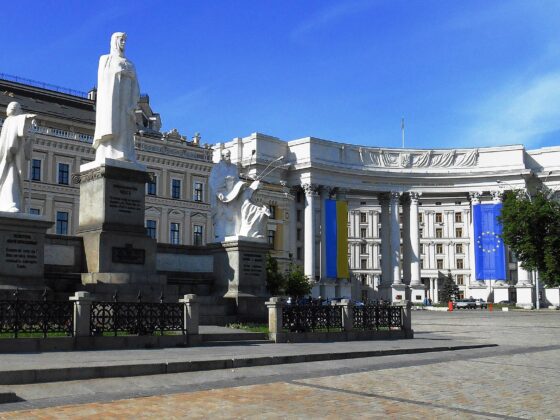When Russia invaded Ukraine in February 2022, the security of the Black Sea region changed forever. Like Ukraine and Moldova, Georgia has long been considered a primary target of Russia’s assertive regional policy. Tbilisi has spent decades trying to escape Moscow’s self-perceived sphere of influence and join Western institutions. While Georgia was susceptible to Russian threats before the invasion, the Ukraine war exacerbated this vulnerability.
The war reinforced the protracted domestic crisis in Georgia, intensifying political polarization. As a result, there is growing tension between Tbilisi and its Western partners and weakening resilience to Russian threats and other geopolitical challenges. Distracted by political crises at home, the Georgian political class has failed to think strategically about the country’s security and place in Europe and the international order. The long-serving Georgian Dream (GD) government has worked for years to reduce strains with Moscow, but the Ukrainian onslaught has added to the insecurity in the country’s foreign, security, and domestic policies.
Vulnerable Security
The Russia-Ukraine war has decreased Georgia’s resilience and increased its military and security liability to Russian threats. The 2008 war with Russia left Georgia with virtually no military presence along the Black Sea shore. In case of renewal of hostilities, Russia’s navy could storm Georgia’s Black Sea coast without significant resistance. Unlike Ukraine, which is slowly becoming a formidable military power, Georgia’s military reform has been stuck for over a decade. Despite its drastically deteriorated military, defense spending has been minuscule (around $300 million) for the past few years. While some voices in the West advocate for arming Georgia due to Russia’s regional assertiveness, the Georgian government remains ambivalent.
Georgia’s democratic backsliding coincides with the West’s diminished geopolitical presence in the wider Black Sea area, which creates less favorable conditions for democratic advancement in the volatile region. Georgia’s vulnerability is further strengthened by the absence of committed military allies and/or credible security guarantees such as NATO’s Article 5. In this respect, Georgia is in a more vulnerable position than Azerbaijan, which has a military alliance with Turkey, or Armenia, which is part of the Collective Security Treaty Organization (CSTO) and allied with Russia.
In addition, Georgia remains unconvinced about Turkey’s role in regional stability and security. Ankara’s regional assertiveness, transactional policies with Moscow, and its complicated ties with the West—as well as the recent authoritarian turn of the Turkish government—make Tbilisi more cautious about Turkey’s role in regional geopolitics. Moreover, Ankara’s initiative to create a 3+3 format for the South Caucasus, which included Iran, Turkey, and Russia but excluded any Western power, only added to Georgian concerns about the credibility of Turkey as a strategic partner.
The Russian invasion of Ukraine also creates new risks in the occupied territories of Abkhazia and South Ossetia. Depending on the war’s outcome in Ukraine, the Kremlin may decide to annex these regions. In South Ossetia, the Russian-backed separatist leadership has long expressed the wish to join Russia and even initiated a referendum about the issue after the Russia-Ukraine war broke out. Moscow has not endorsed the overture yet, but its calculus may change depending on the outcome of the Ukrainian war: if Moscow suffers significant losses in Ukraine, the annexation of South Ossetia and/or Abkhazia may serve as a good diversionary move to pacify domestic discontent for a while.
The Russia-Ukraine war also exacerbated hybrid risks for Georgia. The Georgian government decided not to impose a visa regime on Russia following the war, and there has been a massive influx of Russian citizens following Western sanctions. According to statistics, 247,149 Russian citizens entered Georgia in January-June, a significant increase from the previous year. In the same period, 13,500 Russian companies registered in the country, nearly double the number in 2021. The increased number of Russian business and citizens have not created any major accidents in Georgia yet. However, many fear that the Russian authorities could use this process as a pretext for a false flag operation. A recent petition demanding the government instate a visa regime on citizens of Russia and Belarus collected almost 20,000 signatures within a few days. However, the Georgian government has so far ignored these demands, vowing instead to defend Russian citizens from xenophobia and discrimination.
Messy Domestic Politics Harm Georgia’s European Future
Georgia’s disarray of domestic politics has further exacerbated its deteriorated security and stability. Over the past few years, Georgia has effectively become an inward-looking country, preoccupied mostly with domestic policy. The war in Ukraine added another layer of conflict to Georgia’s radicalized domestic political dynamics.
Even before the Russian invasion of Ukraine, the GD government had pursued an accommodating policy toward Moscow, attempting to respect Russian strategic interests and security concerns through self-constraint and economic rapprochement. While the policy worked to some extent in relatively peaceful times, it has proven inadequate since the Russian invasion of Ukraine. The accommodating positioning of the GD government was welcomed by the Kremlin but sparked large-scale protests at home. It also hindered unity with its strategic partner Ukraine and contributed to weakening the Associated Trio format comprised of Moldova, Ukraine, and Georgia.
Georgia’s European future has become increasingly uncertain under GD’s emerging authoritarianism. It has been attacking civil society actors that observe governmental activities and has been “in an unprecedented fight with the EU and the United States,“ as Thomas de Waal writes. While the West is focused on preventing the Ukraine war from spilling into other countries, Georgian officials started unprecedented attacks and spread conspiracy theories against EU and U.S. officials, accusing them of being overly involved in Georgia’s judicial processes, or attempting to involve Georgia in the war against Russia—policies that look like deliberate efforts to distance the country from the West’s orbit.
In light of questions regarding Georgia’s democratic backsliding and the government’s commitment to European integration, the EU demanded that the government reduce corruption, improve democratic governance, and protect human rights before receiving EU membership candidacy status. The government has responded erratically: while it promised to carry out the requested reforms, it seems to lack both the political will and the ability to take steps that could lead to a more democratic environment involving power-sharing arrangements with the political opposition.
The EU is also demanding the depolarization of Georgian politics; however, both the Georgian government and the fragmented opposition appear to be entrenched in their narrow political agendas. Neither side seems truly interested in escaping zero-sum politics. The ruling party fears that the fulfillment of the 12 reforms, including de-oligarchization, may lead to it losing power; the opposition fears that if they cooperate with the government, it may strengthen the GD before the 2024 parliamentary elections. Civil society, which should be bridging differences and acting as an honest broker between parties, is increasingly swallowed up by polarization, thus unable to play a meaningful role in the process.
For political actors in the ruling party and some parts of the political elite, demonizing the West has become an important part of domestic politics. In order to avoid traditional political vendettas (in case the government loses power), GD, with the support of the shadow ruler of the country, Bidzina Ivanishvili (who recently had some banking problems in Europe), clings to power at any cost. It has pressured Western governments to support the interests of the current regime, which also means curbing support for civil society, independent media, and opposition groups. This policy was spelled out by one of four members of parliament who recently split from the GD majority citing the need to speak the “truth” more openly. This group is widely believed to be acting on party orders to give a voice to hardline positions and conspiracy theories. Developments like this could ultimately weaken the nation’s consensus over its pro-Western foreign policy.
Risks of Decoupling from the Associated Trio
As a result of Russian aggression against Ukraine, the EU decided to accelerate the integration process of the Associated Trio countries and grant all three an EU membership perspective. However, Brussels granted membership candidate status to Ukraine and Moldova but required Georgia to fulfill a number of political conditions before it could qualify. Many pro-European Georgians perceived the European Council’s decision as a missed opportunity. This perception is rooted in the fact that Georgia used to be a frontrunner in the Eastern Partnership project, and it is now one step behind the rest of the Associated Trio.
The decision was the EU’s response to Georgia’s democratic backsliding. Using membership conditionality is a pervasive part of EU enlargement policy and could help stabilize and discipline Georgia’s reform drive and empower pro-reform actors. At the same time, it is anything but certain the Georgian government will prioritize the EU-mandated reforms over its interests, as fulfilling some of the recommendations would force the Georgian Dream to give up some power. Instead, the government seems more intent on limiting the EU and the West’s sway in Georgia’s domestic politics.
Evolving geopolitics and the immaturity of Georgia’s political elite may cause the country to lose its strategic compass and, in the worst-case scenario, be cut off from the Associated Trio for a long time. If relations with the EU and the United States further deteriorate, Georgia will be more vulnerable, and its government will be more willing to deepen ties with its northern neighbor. In that scenario, Russia will gain influence over Tbilisi. It could turn the strategic Black Sea country into its full-fledged protectorate or provoke constant conflict, creating an unstable buffer state. Either reality would contradict the strategic vision of the West that calls for building a resilient, stable, peaceful, and prosperous neighborhood around the Black Sea.
Conclusion: Another Important Crossroad
Georgia is entering the most turbulent period of its democratic development, and at this pivotal movement, the country seems to be losing its strategic compass and the foundation of its foreign policy. The Russian invasion of Ukraine triggered a chain of events that confirmed Georgia’s place as an important crossroads between Russia and the West externally, and between authoritarianism and democratic development internally.
The ruling GD party came to power a decade ago, vowing to reduce tension in Tbilisi-Moscow relations. While it has partially accomplished that goal, in recent months it has also increasingly used rhetoric to distance itself from its closest ally, the United States, sounding occasional isolationist notes while appearing less and less committed to Western-backed democratization efforts. If this policy continues, Georgia may eventually be isolated from its Western partners and allies and could even move closer to Russia. While rational criteria cannot be relied upon to predict Moscow’s actions towards Georgia, a more authoritarian and isolationist government in Tbilisi better suits the Kremlin’s strategic interest in the region. An isolated Georgia would be more vulnerable to influence from other illiberal powers and could reverse its progress in democratization over the last two decades.
Moving forward, the EU and the United States need to play their hands very carefully. While they should not tolerate the streak of Orbanism being tested by the Georgian government, they must avoid becoming a scapegoat in domestic politics. The Western friends of Georgia need to show strategic patience and let the Georgian political elite sort out internal problems while continuing unwavering support to civil society, independent media, and other democratic institutions. Domestic pressure from civil society and Georgian citizens on the ruling party is critical to ensure the government remains committed to the democratization agenda. At the same time, Western actors need to provide Georgia with a more clear-cut strategic vision. In particular, the EU and the United States need to transition from reactive players to proactive and pre-emptive actors who can take bolder strategic steps to ensure the region’s democratization.
Kornely Kakachia is Professor of Political Science at Ivane Javakhishvili Tbilisi State University, and Director of the Georgian Institute of Politics.
Bidzina Lebanidze is Postdoctoral Fellow at the Friedrich Schiller University Jena and Senior Policy Analyst at the Georgian Institute of Politics.











